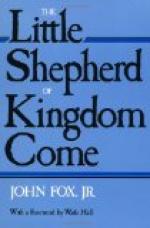“Well, I axe you now,” laughed the Major, but Chad saw nothing to laugh at.
“Chad,” he said.
“Chad what?”
Now it had always been enough in the mountains, when anybody asked his name, for him to answer simply—Chad. He hesitated now and his brow wrinkled as though he were thinking hard.
“I don’t know,” said Chad.
“What? Don’t know your own name?” The boy looked up into the Major’s face with eyes that were so frank and unashamed and at the same time so vaguely troubled that the Major was abashed.
“Of course not,” he said kindly, as though it were the most natural thing in the world that a boy should not know his own name. Presently the Major said, reflectively:
“Chadwick.”
“Chad,” corrected the boy.
“Yes, I know”; and the Major went on thinking that Chadwick happened to be an ancestral name in his own family.
Chad’s brow was still wrinkled—he was trying to think what old Nathan Cherry used to call him.
“I reckon I hain’t thought o’ my name since I left old Nathan,” he said. Then he told briefly about the old man, and lifting his lame foot suddenly, he said: “Ouch!” The Major looked around and Chad explained:
“I hurt my foot comin’ down the river an’ hit got wuss walkin’ so much.” The Major noticed then that the boy’s face was pale, and that there were dark hollows under his eyes, but it never occurred to him that the lad was hungry, for, in the Major’s land, nobody ever went hungry for long. But Chad was suffering now and he leaned back in his seat and neither talked nor looked at the passing fields. By and by, he spied a crossroads store.
“I wonder if I can’t git somethin’ to eat in that store.”
The Major laughed: “You ain’t gettin’ hungry so soon, are you? You must have eaten breakfast pretty early.”
“I ain’t had no breakfast—an’ I didn’t hev no supper last night.”
“What?” shouted the Major.
Chad stated the fact with brave unconcern, but his lip quivered slightly—he was weak.
“Well, I reckon we’ll get something to eat there whether they’ve got anything or not.”
And then Chad explained, telling the story of his walk from Frankfort. The Major was amazed that anybody could have denied the boy food and lodging.
“Who were they, Tom?” he asked
The old driver turned:
“They was some po’ white trash down on Cane Creek, I reckon, suh. Must’a’ been.” There was a slight contempt in the negro’s words that made Chad think of hearing the Turners call the Dillons white trash—though they never said “po’ white trash.”
“Oh!” said the Major. So the carriage stopped, and when a man in a black slouch hat came out, the Major called:
“Jim, here’s a boy who ain’t had anything to eat for twenty-four hours. Get him a cup of coffee right away, and I reckon you’ve got some cold ham handy.”




